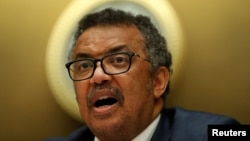The World Health Organization's annual conference ended on a high note Saturday, with the organization's director general praising delegates for giving him a strong mandate to implement an ambitious program of reforms and initiatives that will improve global health.
WHO chief Tedros Adhanom Ghebreyesus paid homage to his predecessor, Margaret Chan, saying the reforms begun under her leadership to make the World Health Organization more responsive and better able to tackle emergencies were now paying off.
"The current Ebola outbreak in the Democratic Republic of the Congo has demonstrated exactly that. ... Let me assure you that I am personally committed to ensuring that we do everything we can to stop this outbreak as soon as possible," Tedros said. "And the commitment of the government, of course, and the leadership is at the center, which we really admire."
The World Health Assembly, the decision-making body of the WHO, passed a number of resolutions aimed at improving global health. Some deal with diseases that have plagued humanity for centuries, while others are newly emerging.
But all these decisions, Tedros said, involve commitments to make the world a healthier, safer place. For example, he noted the assembly had approved a road map to reduce deaths from cholera by 90 percent by 2030.
"You endorsed our five-year strategic plan on polio transition, to strengthen country health systems that could be affected by the scaling down of the Global Polio Eradication Initiative," he said. "You passed resolutions on tuberculosis and noncommunicable diseases. ... And you have agreed to increase the development and use of digital technologies to improve health and keep the world safe."
Tedros urged the delegates to go back to their countries with renewed determination to work every day for the health of their people. How well they succeed in this endeavor, he said, will be measured by the outcomes, by whether they result in real change on the ground.




